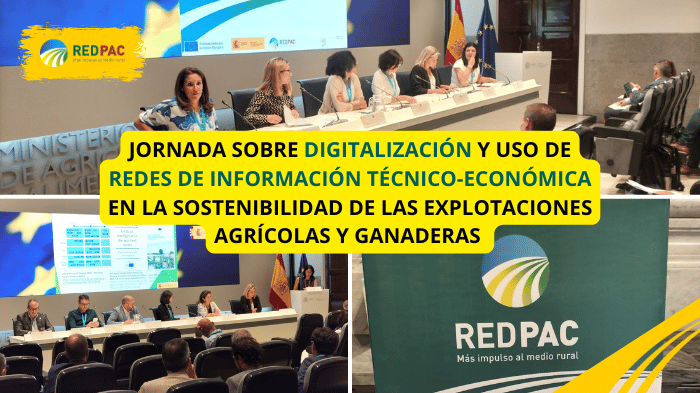
30 de September de 2024
The TECO Networks are technical and economic information systems sponsored by the Ministry of Agriculture on agricultural sectors with the primary objective of making comparisons.
- The meeting brought together ranchers, farmers, representatives of agricultural organizations, administrations, and all entities interested in the topic of digitalization and use of agricultural information networks.
- The event took place at the headquarters of the Ministry of Agriculture, Fisheries and Food and virtually on September 18.
"Without the collaboration of [farm] producers, we wouldn't be able to compare ourselves with the rest of the European Union and the world." This is what Ana Rodríguez Castaño, Secretary General for Agricultural Resources and Food Security, says about agricultural professionals, who provide their data to the administration for multiple tasks.
These statements were made during the conference on "Digitization and Use of Technical-Economic Information Networks in the Sustainability of Agricultural and Livestock Farms" on September 18.
The TECO Networks, a Crop Network, are defined as a technical and economic data information system, based on the concept of Typical Farming and Analysis and Discussion Panels, for herbaceous and industrial crop production systems in Spain. Their objective is to contribute to a greater understanding of their current situation.
It was an online and in-person event organized by the PAC Network , in which livestock farmers, farmers, representatives of agricultural organizations, administration and all entities with an interest in the subject of these networks ( TECO Networks ) met at the headquarters of the Ministry of Agriculture, Fisheries and Food ( MAPA ) in Madrid.
TECO networks for professionals
The TECO Networks project arose from the need for technical and economic information systems for agricultural sectors, with the primary objective of making comparisons . These balances, supported by the MAPA (Mechanical Agricultural Management System), are compiled within a single farm and between farms and other farms at the regional, national, and international levels.
This data generation ultimately facilitates short-term decision-making by agricultural professionals and subsequent modifications to their production structures.
One of its objectives is to integrate into most agricultural productions, as is the case with the National Network of Typical Farms for the dairy cattle sector ( Rengrati ), established in dairy productions but which over the years has also evolved into most types of agricultural productions.
"Success belongs to the producer," Rodríguez Castaño asserted, "who generously invests time in us and shares their data with us."
The future of networks and information
The event focused on the need to continue the process of digitizing data use and developing supporting policies to drive the digital transformation of the agri-food and forestry sectors.
The objective of the day was twofold:
- To present the information network systems developed by MAPA , including their origins and recent developments, as well as their importance for the agricultural sector and the administration itself.
- To publicize various national and international initiatives related to the use of data, as well as the support provided by the government to promote the digitalization of the agricultural sector.
Thus, the conferences were held with aprogram that included representatives from the ministry, experts in agricultural digitalization, representatives of agricultural organizations, heads of agricultural digitalization and data collection companies, and experts in support policies.
Thanks to their presentations and a roundtable discussion where these experts assessed the success and challenges of the project, a series of useful conclusions for the future were reached:
- It is necessary to educate and inform about the privacy guarantees regarding the data provided to the administration. This data is collected exclusively for the purpose of studies and comparisons, and not to extract personal information or conclusions that could lead to problems for producers.
- It is necessary to continue the path toward interoperability of the various databases from the regional to the continental level.
- Not only is it necessary to have data, and quality data, but it is also necessary to have methodologies and professionals who know how to analyze them and obtain useful information from statistical sources.
- In a globalized world, long-term technical and economic decisions cannot be made without data collection (by agricultural professionals) and subsequent analysis and comparison (by the MAPA).
- TECO Networks offer efficiency , competitiveness and sustainability to agricultural professionals.
“ Data is the new raw material , […] the element we must work with to make a difference,” stressed Isabel Bombal, Director General of Rural Development, Innovation and Agri-Food Training, at the event’s closing ceremony. She stated that the Spanish agri-food sector is “at the forefront” in this regard, following 20 years of work.
Bombal concluded by establishing three key future priorities for the administration to ensure the project meets its objectives:
- Agricultural professionals need to be made aware of the benefits of data collection and analysis.
- Legal security must be provided to all actors through "responsible oversight" that guarantees the proper functioning of the entire chain.
Emphasize that sharing data doesn't mean losing control of it. Transferring data to public administrations guarantees its security, and the conclusions and models derived from it reflect the totality ("macro"), never a specific exploitation.











